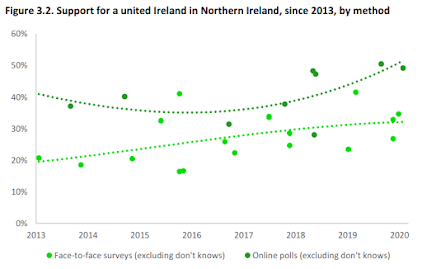On the 23rd February, at the height of the transient post Brexit freight blockages between NI and the rest of the UK, the BBC reported loyalists saying that "There is "palpable anger" among unionists over the NI Protocol but loyalists are not thinking of a return to violence" (BBC). So why is there so much violence in April?
A young protestant man gave an interview on BBC television news yesterday where he said that the violence was not because of the border issues, it was because the loyalists felt defeated. That Sinn Fein had won. The BBC summarised this as the violence being about Brexit. This despite the BBC itself having commissioned a poll that showed that 83% of NI voters did not believe Brexit affected their view of a United Ireland.
The broadcast media have been assiduously suppressing the truth about Northern Ireland. This truth is very simple: according to the Belfast Agreement (Good Friday Agreement) and the Northern Ireland Act 1998 the moment that there is a workable majority for the secession of Ireland from the UK there must be a Referendum, a "border poll", to enable secession and the union of Ireland. It is the Sword of Damocles hanging over the head of every Unionist.
The view of Northern Ireland from England is largely "don't care" mixed with a substantial number of people who would just like to get rid of the whole Irish problem.
 |
| The Constitution Unit |
The Republic of Ireland still strongly desire the annexation the North, with over 70% in favour and 57% would like a border poll as soon as possible.
The data on when there will be a secessionist majority in Northern Ireland is mixed. On purely demographic grounds we would expect a majority this decade:
However Catholics are not uniformly against a devolved NI Assembly despite opposing being a part of the UK.
 |
| Institute for Government |
Polls that ask the direct question about whether electors will vote for a united Ireland in a border poll are very mixed and unstable.
 |
| Constitution Unit 2020 |
 |
| Northern Slant |
Again this shows very uneven poll results. The online polls showed much higher support for secession than the face to face polls. The polls are also spread between 2016 (QUB) and 2019 (Ashcroft). A recent update from Lucid Talk puts the figures at 42.3% pro-secession and 46.8% against.
That the Protestants realize the tide of demography is against them is shown in this graphic.
The Unionists clearly feel they are losing. And they are, according to the census data:
This change is reflected in the NI Assembly:
Which also explains why the Assembly collapsed in 2017.
The key to what will happen in NI is the Assembly. If this becomes dominated by Nationalists then they will implement a pro-secession agenda and will, within 15 years, demand a border poll. We have seen this in Scotland and cannot expect NI to differ. Unlike Scotland, NI will be legally obliged to hold a Border Poll if it looks likely to support secession. The next Assembly elections in 2022 will decide whether secession will occur in 15 years or 20 years.
When Labour implemented the Belfast Agreement in 1998 and gave NI away they knew that demography trumps democracy. When Labour implemented the Scottish Parliament in 1998 they knew that self government would eventually end in secession for Scotland. In NI we have both demography and self government favouring secession.
9/3/2021




Comments